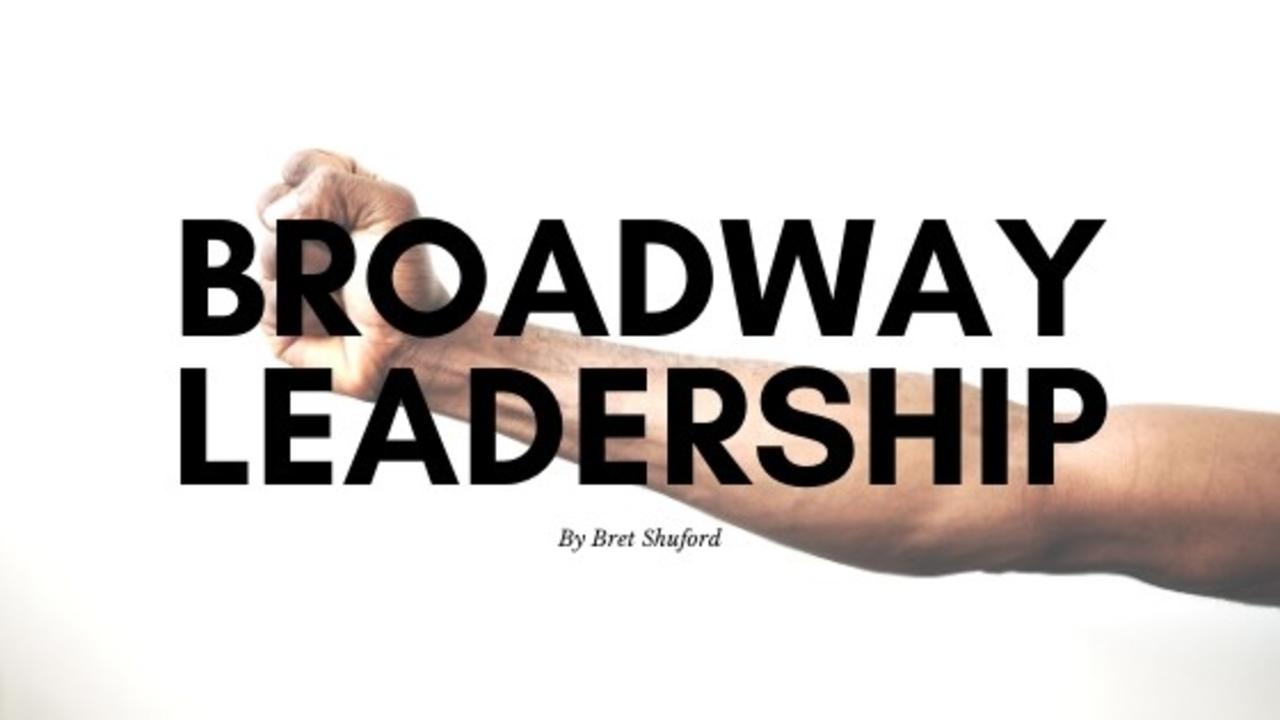What Does Broadway Leadership Look Like?

Every million dollar organization in the world invests in molding its management into quality leaders who know how to communicate and build up their company, leaders who eventually know how to acknowledge, validate, and compassionately turn their employees into leaders.
Yet Broadway has no systems in place for its leadership.
There is no training of this kind for producers, stage managers, and company managers even though they are in charge of handling hundreds of people's livelihoods and stories. Sure, there are unions, but their focus is on advocating for labor contracts, NOT how the industry as a whole evolves and responds to the world.
Broadway is an idea that so many people (including myself) are inspired to dream about and eventually capitalize on by forging careers around it. It’s in the actions we take in Broadway’s name that create a disparity. This is where the inequity begins, and change has to start from the top down (as it does with every conglomeration of people - from governments, to businesses, to us).
It starts with access to theater for children, regardless of their zip code, so they can fall in love with it and be inspired to make it their life's work. It starts with more accessible training, especially at the collegiate level. It starts with writers of all backgrounds being empowered to share their stories. It starts with diverse hiring decisions for artistic directors who help choose which shows to produce that season.
To put it in perspective, The Wellesley Centers for Women and the American Conservatory Theater’s report Women’s Leadership in Resident Theaters found that among 74 League of Resident Theatre (LORT) organizations, during the 2013–2014 season there were no managing directors of Color and only six artistic directors of Color in these nonprofit organizations.
The Actors’ Equity Association’s diversity study found that during 2013–2015, 78.7% of League of Resident Theatres’ stage management contracts of one week or longer went to stage managers who self-identified as Caucasian.
In addition, “The Count 2.0,” which is the Dramatists Guild and Lilly Award’s survey of writers whose works are produced at U.S. regional theaters, found that 15.1% of U.S. theater productions were written by playwrights of Color during the 2016–2017 season.
This is just one statistic in a long history of white people making money off of the stories and creative work of black artists without giving them the credit or representation they are due.
Broadway MUST learn to hire creative leaders that know how to lead and represent ALL of the people involved in a production, especially the vulnerable souls of the artists telling those stories. Producers have a responsibility to create safe, non-hostile and especially inclusive work environments.
These things don’t happen because our “higher-ups” are ill-intentioned but because there is no proper structure and training to model, and that needs to change. Google invests in their leaders' further education to improve their leadership abilities, and what about including HR in the equation to help our company?
Look, I still believe that Broadway is and always has been a place that wants everyone to belong and is always striving to do better at all times. Broadway is a place where everyone is welcome, so we must do better to help our black actors, singers, writers, directors, administrators, dancers, musicians, crew, etc. be seen and heard.
As actors (and human beings), we have a capacity and the ability to speak up. I'm begging you, please don’t be afraid to use your voice! Silence is complicity, and we each can be leaders if we make the decision to do so.
I think investing in Broadway should be investing in leaders who look like us and know how to lead. Broadway should demand that all stage managers, producers, company managers, and directors have quality leadership training like any other million dollar business.
The unions must uphold their rules of keeping the company and their jobs safe, so artists aren’t afraid to say to someone in a leadership position, “That is not right,” without fear of losing their jobs. And these policies must exist not just on paper but in practice in real life.
As Broadway comes back, and it will, I pray that our Broadway community invests in creating true leaders at the top, but most importantly, by building up and investing in the true leaders on stage and backstage.
If you are interested in learning more, I invite you to read Tobie Stein's 2020 report on Racial and Ethnic Diversity in the Performing Arts Workforce.

